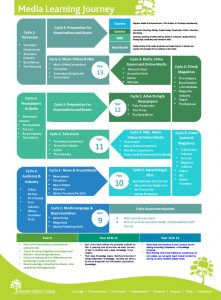Vision
Media Studies at NAC will offer a broad, coherent and rigorous course of study, which will prepare students to make informed decisions about further study and employment.
Intent
The intent of the Media Studies curriculum at Newton Abbot College is to help each student to understand the impact the media has on our society and how the process of mediation affects audiences. The aim is that every student who learns Media Studies leaves NAC empowered to: analyse media bias, learn critical thinking skills and better understand why audiences consume media texts and how they affect them.



